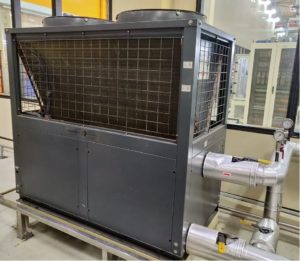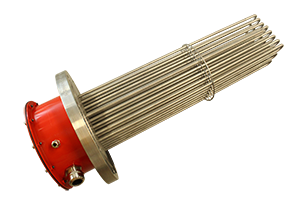In the last blog, we had a “best heating device” title match between the heat pump and boiler to see which device would be the best heating source for industrial heating applications in the temperature range of 40°C – 90°C. The match ended with the heat pump as a clear winner. In continuation to that, we want you to know that what would be the result of “best heating device” title match if we had a match between the heat pump vs electric heater. This blog will give you a clear idea on what is the pros and cons of using the heat pump and electric heater.
Let’s begin the war of Heat pump vs electric heater



Round 1 – Floor Space
Generally, the electrical heaters occupy very less space and immersed in the process tanks. In comparison, the heat pump systems need more footprint for installation. The electrical heater wins this round easily.
Result: HP-EH —> 0 – 1
Round 2 – Efficiency
Electrical Heaters uses electric resistance heating is typically 100% efficient because all of the electrical energy used is converted into heat and there are no combustion losses and piping losses. The efficiency of electrical heaters is much better than boilers. Whereas the efficiency of the heat pump can reach as high as 350% depending on the liquid temperature to be maintained. Therefore, the heat pump wins this round.
Result: HP-EH —> 1 – 1
Round 3 – Quick Startup
Electric Heater can provide a quick startup if the heating system is designed for startup load and operate at intermittent load factors. Because of the cost-effectiveness of electric heaters, the design for startup load will not increase the capital cost significantly. Similarly, the heat pump can be designed for startup load but the capital cost and the maintenance cost associated with it will affect the payback. In industries, the heat pumps are generally designed to generate heat at operating load with electric heater or boiler for startup. Thus, the electric heater wins this round.
Result: HP-EH —> 1 – 2
Round 4 – Life Span
The lifespan of an electric heater will last around 5 – 10 years depending on the nature of process fluid to be handled. While the typical lifespan of an air source heat pump is around 15 years. The heat pump comes back and wins this round.
Result: HP-EH —> 2 – 2
Round 5 – Regulatory Requirements
The regulatory requirement for both the heat pump and electric heater is minimal. This round ends in a tie.
Result: HP-EH —> 2 – 2
Round 6 – Capital Cost
Despite being an efficient system, the capital cost of the heat pump system is costlier than the electric heating system. The electric heater takes the lead by winning this round.
Result: HP-EH —> 2 – 3
Round 7 – Energy Cost
The electric heater consumes more energy to generate thermal energy than the heat pump. This shows that installing a heat pump system will give more than 50% cost benefit over electric heaters. The heat pump wins this round.
Result: HP-EH —> 3 – 3
Round 8 – Maintenance
The general maintenance required for both the heat pump and electric heater is simple, and the cost associated is very low. This round ends in a tie.
Result: HP-EH —> 3 – 3
Round 9 – Environmental Impact
Both the systems are relying on electrical energy for operation. However, the electric heater leaves carbon footprint 3 – 5 times more than the heat pump. The heat pump wins the decider.
Result: HP-EH —> 4 – 3
The fight is over! The heat pump wins the title and has a high potential for cost saving and carbon abatement. We hope this blog gave you a better understanding of the functional and financial difference between both the devices. To know sustainable heat pump solutions and cost benefits, check out our products to know more.
